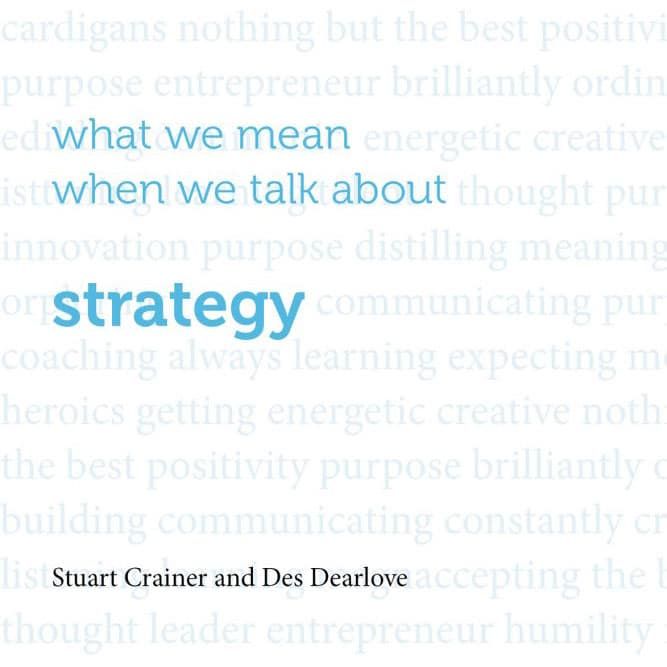

Always start by defining terms. It sounds sensible and straightforward – especially with a subject like strategy which has been studied from every angle.
But it is not.
In 1987 Henry Mintzberg offered five definitions of strategy for consideration: plan, ploy, pattern, position and perspective. Strategy is perhaps most commonly envisaged as a plan — consciously intended action developed in advance. A related concept is strategy as a ploy – a specific manoeuvre designed to outfox opponents. Strategy as pattern –the focus of much of Mintzberg’s research – is a consistency of behavior intended or otherwise. Strategy can be a position, an organization locating itself in an environment as Mintzberg describes it. This definition of strategy is consistent with the preceding definitions; an organization can position itself via plan, as plan, or as a pattern of behavior. Finally, suggests Mintzberg, there is strategy as a perspective. In this instance is effectively the ingrained perspective the organization has, it is collective and shared outlook on the world.
In The Financial Times Guide to Strategy, Richard Koch provides two senses for strategy:
“1. A good strategy is the commercial logic of a business, that defines why a firm can have a competitive advantage and a place in the sun. To be complete, a strategy must include a definition of the domain – the lines of business, types of customer and geographical reach — in which the firm competes. It must also include a definition of the firm’s distinctive competencies and the competitive advantage that gives the firm a special hold on the chosen business domain.
Strategy also means what a company does, how it actually positions itself commercially and conducts the competitive battle. You can always attempt to describe a competitor’s strategy, whether or not you think it sound. In this sense a strategy is what a firm does, not what it says or does, or what its strategy documents propound.”
This provides some reassuring clarity, but also establishes that the scope of strategy is incredibly broad – from the logic of a business to what it actually does. And, as we shall see, the scope of strategy is ever broadening.
Costas Markides, the charismatic London Business School professor, provides this overview: “There is general agreement that every company needs a strategy – either explicit or implicit. Yet, there is surprisingly little agreement as to what strategy really is. Within both business and academic circles, it is not easy to identify two people who share the same definition of ‘strategy’. Differences in opinion on the content and process of developing strategy are passionately argued. Yet these debates cease to matter when we realize two important points. First, strategy needs to be approached from a variety of perspectives. Second, rather than adopt a single perspective at the expense of all others, good strategies have to achieve a fine balance between seemingly divergent views.
“When it comes to strategy, I have found that there are three problem areas of controversy. I believe that sound strategic thinking achieves a fine balance between the arguments surrounding: (1) what constitutes the content and process of strategy, (2) strategy as analysis or creativity and (3) strategy dynamics. Analyzing each area in turn will help in achieving that fine balance.
“Strategy is both of these things: strategy must decide what game we want to play and then determine how to play that game well. As practised today, strategy is preoccupied with fixing the problems in the existing business rather than thinking about future businesses. The essence of a good strategy is to create new markets, new products and new industries. This leads to the position that strategy should be about competing for the industries of the future rather than competing for market share in the industries of today. It is hard to argue with the need to focus the organization’s attention on discovering new markets. But this should not come at the expense of today’s businesses.
“Therefore, the key question for any company is not whether it should try to create the industries of the future but how to take care of its existing business while at the same time attempting to create the industries of the future. Every company should also prepare for an unknown future — either by trying to create this new future itself or by creating the conditions that would allow it to exploit the future when it unfolds.”
As these takes on strategy suggest, strategy really is a moveable feast, an awkward hybrid of delivery in the present and mapping out a persuasive future and route to get there. The challenge for all those charged with leading organizations is to reach their own definition of what strategy is and what it should do. Without this as a starting point, strategy is as useful as whistling in the organizational wind.
Resources
Richard Koch, The Financial Times Guide to Strategy, FT Prentice Hall, 2011
This was originally published in What we mean when we talk about strategy by Stuart Crainer and Des Dearlove (Infinite Ideas, 2016).

Thinkers50 Limited
The Studio
Highfield Lane
Wargrave RG10 8PZ
United Kingdom

Thinkers50 Limited
The Studio
Highfield Lane
Wargrave RG10 8PZ
United Kingdom

| Cookie | Duration | Description |
|---|---|---|
| LANG | 9 hours | Linkedin set this cookie to set user's preferred language. |
| nsid | session | This cookie is set by the provider PayPal to enable the PayPal payment service in the website. |
| sp_landing | 1 day | The sp_landing is set by Spotify to implement audio content from Spotify on the website and also registers information on user interaction related to the audio content. |
| sp_t | 1 year | The sp_t cookie is set by Spotify to implement audio content from Spotify on the website and also registers information on user interaction related to the audio content. |
| tsrce | 3 days | PayPal sets this cookie to enable the PayPal payment service in the website. |
| x-pp-s | session | PayPal sets this cookie to process payments on the site. |
| __cf_bm | 30 minutes | This cookie, set by Cloudflare, is used to support Cloudflare Bot Management. |
| Cookie | Duration | Description |
|---|---|---|
| l7_az | 30 minutes | This cookie is necessary for the PayPal login-function on the website. |
| Cookie | Duration | Description |
|---|---|---|
| CONSENT | 2 years | YouTube sets this cookie via embedded youtube-videos and registers anonymous statistical data. |
| _ga | 2 years | The _ga cookie, installed by Google Analytics, calculates visitor, session and campaign data and also keeps track of site usage for the site's analytics report. The cookie stores information anonymously and assigns a randomly generated number to recognize unique visitors. |
| _gat_gtag_UA_10408481_1 | 1 minute | Set by Google to distinguish users. |
| _ga_ZP8HQ8RZXS | 2 years | This cookie is installed by Google Analytics. |
| _gid | 1 day | Installed by Google Analytics, _gid cookie stores information on how visitors use a website, while also creating an analytics report of the website's performance. Some of the data that are collected include the number of visitors, their source, and the pages they visit anonymously. |
| Cookie | Duration | Description |
|---|---|---|
| NID | 6 months | NID cookie, set by Google, is used for advertising purposes; to limit the number of times the user sees an ad, to mute unwanted ads, and to measure the effectiveness of ads. |
| test_cookie | 15 minutes | The test_cookie is set by doubleclick.net and is used to determine if the user's browser supports cookies. |
| VISITOR_INFO1_LIVE | 5 months 27 days | A cookie set by YouTube to measure bandwidth that determines whether the user gets the new or old player interface. |
| YSC | session | YSC cookie is set by Youtube and is used to track the views of embedded videos on Youtube pages. |
| yt-remote-connected-devices | never | YouTube sets this cookie to store the video preferences of the user using embedded YouTube video. |
| yt-remote-device-id | never | YouTube sets this cookie to store the video preferences of the user using embedded YouTube video. |
| yt.innertube::nextId | never | This cookie, set by YouTube, registers a unique ID to store data on what videos from YouTube the user has seen. |
| yt.innertube::requests | never | This cookie, set by YouTube, registers a unique ID to store data on what videos from YouTube the user has seen. |
| Cookie | Duration | Description |
|---|---|---|
| DEVICE_INFO | 5 months 27 days | No description |
| loglevel | never | No description available. |
| m | 2 years | No description available. |
Thinkers50 Limited has updated its Privacy Policy on 28 March 2024 with several amendments and additions to the previous version, to fully incorporate to the text information required by current applicable date protection regulation. Processing of the personal data of Thinkers50’s customers, potential customers and other stakeholders has not been changed essentially, but the texts have been clarified and amended to give more detailed information of the processing activities.